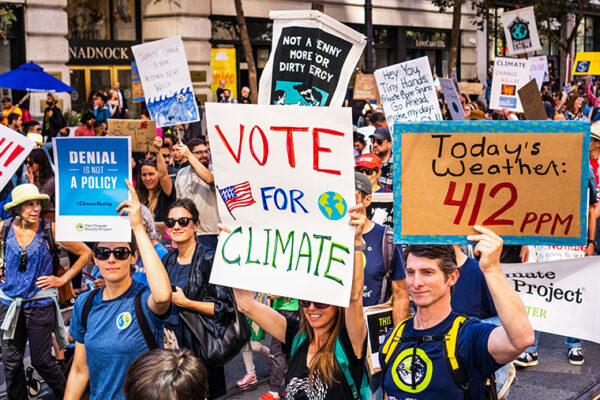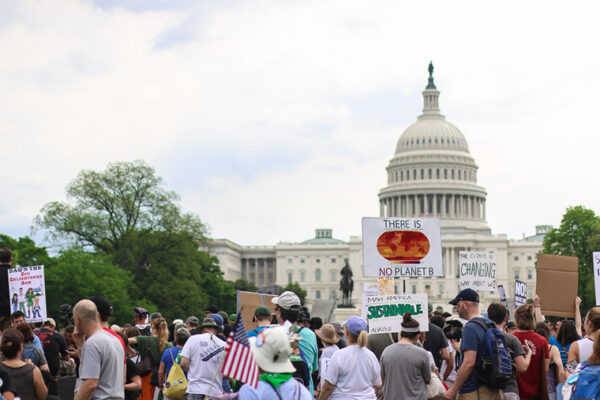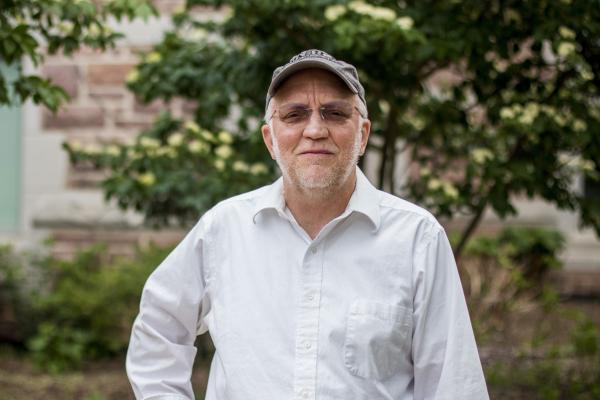Work has hardly slowed down for William R. Lowry, professor emeritus of political science in Arts & Sciences at Washington University in St. Louis, since he retired in 2021. For the last two years, he has labored to complete and publish a book written by his dear friend, Michael J. Yochim, who died Feb. 29, 2020, after battling amyotrophic lateral sclerosis (ALS) for more than six years.
The book, “Requiem for America’s Best Idea: National Parks in the Era of Climate Change,” is both a love letter to Yochim’s treasured national parks and an urgent plea to save them from the effects of climate change. Publishing the book was Yochim’s dying wish. Now, thanks to Lowry and Yochim’s family, that wish has been realized.

“It was an honor to be part of this work,” Lowry wrote in the epilogue. “Mike was, simply put, the most inspirational person I’ve ever known. He dealt with his fate with grace, humor and a concern for things larger than himself that was truly remarkable.”
Yochim loved and dedicated his life to the national parks. He worked for 22 years at Yellowstone National Park, as well as Yosemite, Grand Canyon and Sequoia. He was an avid hiker, backpacker, cross-country skier and an impressive backcountry chef who savored any chance to enjoy the beauty of the parks. Yochim also was a staunch advocate for the parks, whose future he understood to be threatened by climate change and the fires, drought, disease and extreme temperatures that come with it.
Lowry — whose work focused on American politics, environmental and energy policy and natural resource issues — met Yochim in the 1990s at Yellowstone while doing research on national parks. Yochim, a St. Louis native, and Lowry quickly bonded over their Midwestern roots and love of the national parks. They kept in touch over the years and never missed an opportunity to get together when their paths crossed.
In 2013, Yochim was diagnosed with ALS. Shortly after, he moved back to St. Louis to live with his parents. In the years that followed, the disease ravaged his body, eventually leaving him only able to control his eyes. He used an eye tracking machine to communicate. Yochim found peace in his memories of the parks. In writing “Requiem for America’s Best Idea: National Parks in the Era of Climate Change,” he sought to protect them for future generations.
‘Mike understood that his terminal illness enabled him to appreciate the challenges facing the parks as no one else could. He knew that even though his fate was determined, that of the parks is not.’
William R. Lowry
In the book, Yochim established a unique parallel between his own struggle with a terminal illness and the impact climate change is having on the national parks. With chapters dedicated to Olympic, Grand Canyon, Glacier, Yellowstone and Yosemite national parks, Yochim recalled stories of his experiences in the parks in beautiful detail. He also explained how climate change is already impacting the vegetation, wildlife and natural conditions in the parks.
Remarkably, Yochim wrote the book entirely with his eyes. The writing was exhausting — taking hours to complete a single paragraph, Lowry said. Yet he refused to give in to the disease.
“Mike understood that his terminal illness enabled him to appreciate the challenges facing the parks as no one else could,” Lowry said. “He knew that even though his fate was determined, that of the parks is not. We can still change to save these wonderful places. But we must act.”
Knowing that his health was deteriorating, Yochim asked Lowry to complete the book if he was not able to. The two previously had collaborated on a paper advocating for policy changes in national parks. Lowry kept his promise to his late friend. With the help of Yochim’s family, he made edits, compiled photos, created maps, wrote the foreword and epilogue that accompanies the book and secured a publisher.
On March 15, Left Bank Books, the Environmental Studies program in Arts & Sciences at WashU, the National Parks Conservation Association and the St. Louis Regional Chapter of the ALS Association will host a virtual event to celebrate the book launch and Yochim’s life. Lowry will moderate a discussion among family and friends of Yochim. The event will begin at 7 p.m. and will be livestreamed on Left Bank Books’ YouTube and Facebook channels.
A lasting legacy
The poet Rabindranath Tagore said, “The one who plants trees, knowing that he will never sit in their shade, has at least started to understand the meaning of life.”
Yochim spent his most of his life working in the parks and making them accessible for all who came to enjoy their natural beauty. Even when his active mind was trapped inside a body that was deteriorating, Yochim remained steadfast in his commitment to protect them — not for himself, but for all who will come after him.
In the epilogue, Lowry shared Yochim’s final words, which illustrate that commitment:
I enjoy being outside, sitting and reading in the extensive gardens my folks have around their house. The property next door is thickly wooded, so we see deer on a regular basis, and an occasional red fox or raccoon. Birds like it here too, finding feeders and houses scattered about. One afternoon, I was sitting beside a birdhouse that was busy with house wrens bringing food to their chicks. I thought I saw one chick fledge, and soon its nest-mate did as well — right onto my armrest! Its maiden flight wasn’t long and came with a rough landing, for it was on its side with its claw around my finger. It righted itself and then looked right at me, then flew away. Such a neat encounter with nature’s wildness, right in the backyard. Will we act in time to give future generations the same experiences?



